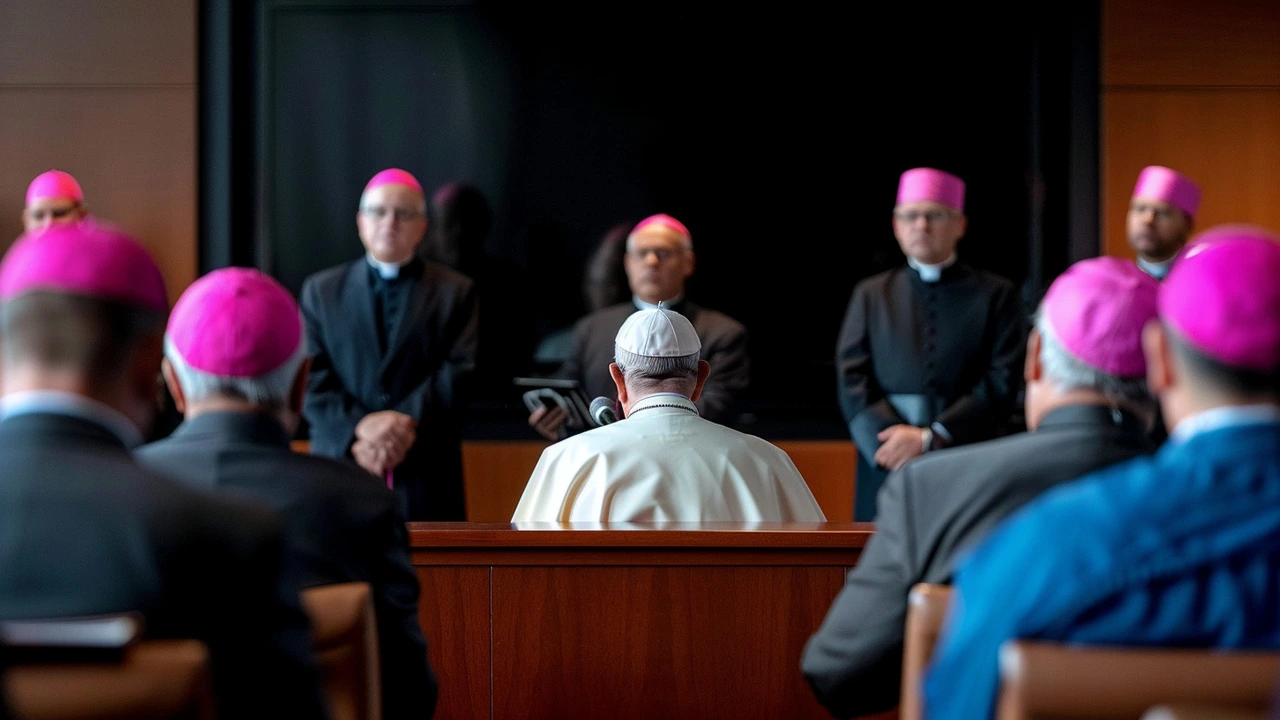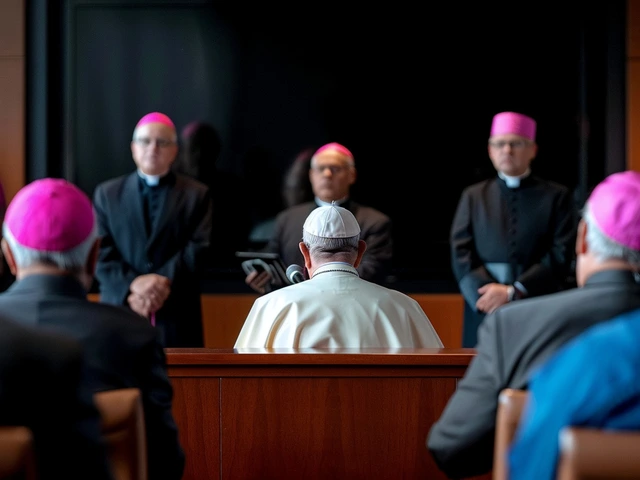Pope Francis Addresses Misinterpretation Over Italian Bishops' Conference Remarks
In a gesture of humility and respect, Pope Francis has openly apologized for any offense caused by his remarks during a private conversation with the Italian Bishops' Conference (CEI). This incident has sparked significant discourse on the Pope's stance regarding LGBTQ+ individuals within the Church.
The comments in question were not publicly disclosed but led to allegations of homophobia, prompting an immediate response from the Holy See. Matteo Bruni, the Director of the Holy See Press Office, acted as the spokesperson for the Pope, clarifying the intent behind the Pontiff's words. Bruni underscored that Pope Francis had no intention of promoting homophobic views. Instead, he asserted the Pope's consistent message of inclusivity, affirming that there is 'room for everyone in the Church.'
A Plea for Understanding and Clarification
Bruni's statement aimed to dissolve any misunderstandings that arose from the Pope's remarks. He conveyed Pope Francis' deep regret over the misinterpretation, emphasizing that the Pope's words were meant to foster unity and acceptance within the Church. The core message the Pope wanted to deliver was clear: 'No one is useless; no one is superfluous; there is room for everyone. Just as we are, everyone.' This sentiment highlights the fundamental principle of inclusivity that the Pope has advocated throughout his papacy.
The incident has reignited discussions on the Catholic Church's position on LGBTQ+ issues. While some conservative factions within the Church hold traditional views, Pope Francis has been a figure of progressive change, often sparking debate with his more inclusive rhetoric. His famous statement, 'Who am I to judge?' regarding gay priests, is a testament to his approach toward fostering an environment of acceptance and compassion.
Reiterating the Church's Commitment to Inclusivity
Pope Francis' apology and clarification are a reaffirmation of his commitment to making the Church a welcoming place for all, irrespective of their background or sexual orientation. The Pontiff's vision for the Church is one where every individual, regardless of their identity, can find a place of belonging and spiritual solace. This vision stands in stark contrast to the historical exclusionary practices that have often characterized religious institutions.
The Pope's stance has been both lauded and criticized. Supporters argue that his approach aligns with the fundamental Christian tenets of love, compassion, and acceptance. They believe that his progressive views are essential for the Church to remain relevant in a rapidly changing world. Critics, on the other hand, argue that the Pope's statements can create confusion and lead to a dilution of traditional values.
However, the core of Pope Francis' message remains unshaken. He continues to push for a Church that is inclusive and compassionate, a place where every individual feels valued and respected. His apology not only aims to address the concerns of those who felt hurt by his remarks but also reinforces his unwavering dedication to inclusivity.
The Impact of Pope Francis' Apology
The apology has had a ripple effect, sparking conversations within and outside the Catholic community. Many see this as a positive step towards greater inclusivity, while others view it as a necessary reminder of the Church's mission to love and accept all individuals. The Pope's words have resonated with many, particularly those who have felt marginalized by religious institutions in the past.
In a broader context, this incident reflects the ongoing struggle within the Catholic Church to reconcile traditional doctrines with contemporary societal values. Pope Francis' leadership has been pivotal in navigating this complex landscape, often facing resistance from conservative quarters. Nevertheless, his unwavering commitment to inclusivity and compassion continues to inspire many.
The apology also serves as a reminder of the power of language and the importance of communication. In an age where words can be easily misinterpreted and magnified, Pope Francis' prompt response highlights the necessity of clarity and empathy in addressing sensitive issues. It underscores the need for leaders to be mindful of their words and their impact on diverse audiences.
A Vision for a More Inclusive Church
Pope Francis' vision for the Church is one that resonates with many who advocate for a more inclusive and compassionate institution. His efforts to bridge the gap between traditional values and modern societal norms reflect a dynamic and evolving approach to leadership. As the Church continues to navigate these turbulent waters, the Pope's guidance remains a beacon of hope for many.
In conclusion, the apology issued by Pope Francis serves as a testament to his commitment to inclusivity and respect for all individuals. It reinforces his vision for a Church that welcomes everyone, regardless of their background or identity. As the Catholic Church moves forward, this incident serves as a pivotal moment in its journey towards greater acceptance and understanding.
Pope Francis' message is clear: the Church is a place of love, acceptance, and compassion. His apology reaffirms this message, offering hope and solace to those who seek a place of belonging within the Church. As the world continues to evolve, the Pope's vision for an inclusive and compassionate Church remains as relevant as ever.








Ketan Shah
May 29, 2024 AT 19:16Reading the Pope’s apology through a cultural lens, it’s clear that the Vatican is trying to bridge a gap that has existed for centuries between doctrine and lived experience. In many societies, especially where traditional values dominate, the very idea of an inclusive church can feel like a foreign concept, so the Pope’s reassurance is more than just a statement-it’s a diplomatic gesture. By emphasizing that there is "room for everyone," he is essentially extending an olive branch to communities that have felt marginalized. This approach mirrors how diplomats often soften hard‑line policies with language that invites dialogue rather than confrontation. It also reflects an awareness that words travel fast in the digital age, and any misstep can be amplified beyond the intended audience. Ultimately, the apology serves as a reminder that even institutions rooted in centuries of tradition must adapt their rhetoric to stay relevant in a pluralistic world.
Aryan Pawar
May 29, 2024 AT 21:13Wow this is a big step forward! The Pope showing humility and saying sorry really shows he cares about people feeling accepted. It gives hope to those who have been hurt by the Church in the past and proves that compassion still matters.
Shritam Mohanty
May 29, 2024 AT 23:10Typical move-use vague apologies to hide the real agenda.
Anuj Panchal
May 30, 2024 AT 01:06Building on the earlier point, the theological nuance here is that the concept of "inclusivity" can be framed within the doctrine of *catholicity*-the universal nature of the Church. When the Pope references "room for everyone," he is invoking the idea that the sacrament of communion is meant for the whole body of Christ, not just a select few. This is consistent with the Second Vatican Council’s emphasis on the Church as a pilgrim people, constantly moving toward a fuller expression of love and mercy. By aligning his language with established magisterial teaching, the Pontiff avoids outright contradiction while subtly steering the faithful toward a more open posture.
Prakashchander Bhatt
May 30, 2024 AT 03:03It’s encouraging to see such a public acknowledgment; it signals that the Church can evolve without losing its core identity. Even the most cautious believers can find comfort in the notion that compassion remains at the heart of the faith.
Mala Strahle
May 30, 2024 AT 05:00One might wonder why this moment feels particularly resonant in today’s climate, where the clash between tradition and modernity is ever‑present. The Pope’s apology, however, is not merely a reactionary gesture; it is part of a broader theological trajectory that has been unfolding over the past few decades. By repeatedly emphasizing that there is "room for everyone," he is invoking the biblical motif of the banquet-a symbol of divine hospitality that transcends social hierarchies. This imagery has deep roots in both early Christian writings and the liturgical traditions of the Western Church, suggesting that the call for inclusivity is not a novel invention but a return to an ancient ethos. Moreover, the language of regret and clarification serves a dual purpose: it acknowledges the hurt caused by misinterpretations while also reaffirming the Church’s commitment to mercy, a central tenet of Christ’s teaching. In practical terms, this could translate into more pastoral training for clergy, encouraging them to engage with LGBTQ+ individuals in a spirit of empathy rather than judgment. It also opens a conversational space for theologians to revisit scriptural exegesis that has historically been wielded to marginalize. The ripple effect may even extend beyond ecclesial walls, influencing how secular societies perceive religious institutions-as entities capable of self‑critique and growth. Of course, criticism will continue to emerge from those who view such moves as diluting doctrinal purity, but the very existence of this debate signals a dynamic and living tradition. In the end, the Pope’s apology underscores a profound truth: that the Church’s mission is not to enforce rigid boundaries, but to embody the boundless love that the Gospel proclaims. By embracing this paradox, the Church can maintain its identity while extending a genuine welcome to all who seek spiritual solace.
shubham garg
May 30, 2024 AT 06:56Totally agree with the long post above-this kind of honest talk helps a lot of people feel seen and accepted. It’s a simple step that can make a huge difference in everyday lives.
LEO MOTTA ESCRITOR
May 30, 2024 AT 08:53All in all, it’s nice to see a leader taking responsibility and encouraging a more welcoming vibe. Hopefully we’ll keep seeing progress like this.